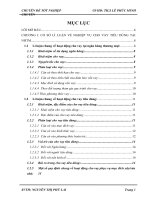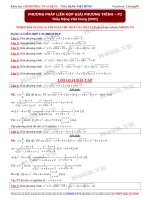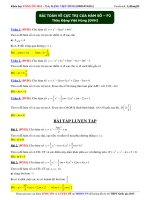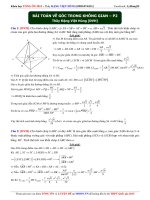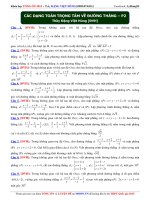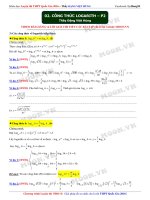02 cplusplusfundamental p2
Bạn đang xem bản rút gọn của tài liệu. Xem và tải ngay bản đầy đủ của tài liệu tại đây (493.16 KB, 39 trang )
Hochiminh University of Technology
Computer Science and Engineering - [CO1011 - 501127]
Fundamentals of
C++ Programming
Basic components
in C/C++ (part 2)
Lecturer: Dustin Nguyen
Outcomes
❖
Understand basic components of C++
❖
Using assignment operator
❖
How to format the output
❖
How to use libraries
❖
How to input values
❖
How to define macro, constants
2
Today’s outline
❖
Assignment operation
❖
Output format (console, string)
❖
Libraries functions
❖
Input with cin
❖
Macro definitions
3
Assignment operation
Assignment operation
❖
<left operand> = <expression>
❖
return <left operand>
❖
<left operand> can’t be constant
❖
Example:
❖
pi = 3.1415;
❖
keyPressed = ‘q’;
5
Assignment operation
❖
Assign at the declaration instruction:
❖
int x = 10;
❖
int y{8};
❖
float z(10.01f);
❖
AnimalC monkey(10.5, 30);// use Class construction
❖
float 8.0 = f;
6
Assignment operation
❖
What is the default type of constants?
❖
Can we assign different types of value to a variable?
7
Assignment operation
❖
Default type of constants depend on how you declare it
❖
❖
10: decimal value, default type depends on context
❖
012: octal value
❖
0x64: hexadecimal value
3.1415: default type is double
8
Assignment operation
❖
❖
Suffixes to specify types:
❖
u/U: unsigned. E.g.: 23u, 23U
❖
l/L: long. E.g.: 75l, 75L, 75UL, 75ul, 75u, 75LU
❖
ll/LL: long long. E.g.: 90l, 90LL, 90ull, 90ULL
❖
f/F: float. E.g.: 3.1415, 6.02e23, 1.6e-19, 6.02e23f, 3.1415F
❖
l/L: long double. E.g.: 3.1415L
Q: is -23U a legal declaration?
9
Assignment operation
❖
NOTE: compiler does not warn you when you assign a value with different
type to variable (default setting)
❖
int a = 1024UL, c = 3.1415;
❖
unsigned int b = -4096;
❖
float x = 6.2830L;
❖
Compiler warns you when overflow problem occurs in the assignment op.
❖
Default cast operation will be applied without warning
10
Cast operator
❖
Implicit convert the value from one type to another type
❖
(<target type>)<expression>
❖
E.g.:
❖
int a = (int)3.9583;
❖
float x = (float)a + 0.5f;
❖
double y = (double)x * (double)a;// y = x * a; is fine
11
Auto type
❖
auto type appears from C++11 standard.
❖
Should we use auto?
❖
Where can we use auto?
❖
auto type: good or bad?
Know what you are doing
Make you code clear
Debug
12
Output format
Output format
❖
Text output format
❖
printf(“i = %d\n”, i);
❖
cout << “i = ” << i << endl;
❖
Using function is a convenient way to format output.
❖
Using I/O streams require a bit modification in the sequence.
14
Output format
❖
printf(<format string>, arguments)
❖
Format string can contain format specifiers with the following syntax:
❖
%[flags][width][.precision][length]specifier
❖
specifier: d/i, u, o, x/X(uppercase), f/F, e/E, g/G, a/A, c, s, p, n, %(escape character)
❖
flags: +, -, space, #, 0
❖
.precision: .number, .*
❖
width: number, *
15
Output format
specifier
output
example
d/i
signed decimal integer
-2354
u
unsigned decimal integer
3056
o
unsigned octal
342
x/X
unsigned hexadecimal integer
6f0c
f/F
decimal floating point
3.14159
e/E
scientific notation
3.14159e-05
g/G
use shortest representation
3.14159
a/A
hexadecimal floating point
-0xc.90dep-3
c
character
a
s
string
damn it
p
pointer address
b8000000
n
nothing will be printed, argument must be a pointer to a signed int. The number
of printed characters are stored location pointed by the pointer.
%
print ‘%’ character
16
%
Output format
❖
Examples
#include <stdio.h>
int main() {
printf ("Characters: %c %c \n", 'a', 65);
printf ("Decimals: %d %ld\n", 1977, 650000L);
printf ("Preceding with blanks: %10d \n", 1977);
printf ("Preceding with zeros: %010d \n", 1977);
printf ("Some different radices: %d %x %o %#x %#o \n", 100, 100, 100, 100, 100);
printf ("floats: %4.2f %+.0e %E \n", 3.1416, 3.1416, 3.1416);
printf ("Width trick: %*d \n", 5, 10);
printf ("%s \n", "A string");
// default cast operation is applied
return 0;
}
17
Output format
❖
Using cout: require “iomanip” for formatting
❖
cout.width(<output width>): set width of the output result, both text and number
❖
❖
cout << setw(<output width>)
cout.precision(<number>): set maximum number of significant digits (set to 0 to
reset this setting)
❖
cout << setprecision(<number>)
❖
cout << “*” << setw(4) << 8 << “*” << endl;
❖
cout << “*” << setprecision(4) << 12356.4 << “*” << endl;
18
Output format
❖
❖
Save old settings:
❖
ios::fmtflags old_settings = cout.flags();
❖
int old_precision = cout.precision();
Load settings:
❖
cout.flags(new_settings);
❖
cout.precision(new_precision);
19
Output format
❖
❖
Fixed format for floating point number
❖
cout.setf(ios::fixed, ios::floatfield);
❖
cout << fixed;
❖
Reset to default: cout.setf(0, ios::floatfield);
E.g.:
❖
cout.setf(ios::fixed, ios::floatfield);
cout.precision(2);
cout << 3.14159 << “, ” << 0.8642e-3;
20
Library functions
Library functions
❖
Library is the place where you implement functions, classes to serve some
specific tasks.
❖
Library contains:
❖
Definitions: constants, macro, structure, class
❖
Functions: implement specific algorithms, a unit of reusable code
❖
Class implementations
22
Library functions
❖
Function: a named sequence of code that performs a specific task
❖
Definition
❖
<return type> <function name>(<in/out parameters>);// prototype
❖
<return type> <function name>(<in/out parameters>)
{
// your implementation
}
23
Library functions
❖
Standard libraries:
❖
<math.h>, <cmath>
❖
<string.h>, <cstring>
❖
<stdio.h>, <cstdio>
❖
<assert.h>, <cassert>
❖
<errno.h>, <cerrno>
❖
<time.h>, <ctime>
24
Library functions
❖
Example
#include <iostream>
#include <string>
#include <cmath>
using namespace std;
int main() {
string name;
char
buffer[50];
float x;
cout << “Please input your name:”;
gets(cin, buffer);
name = buffer;
cout << “Hello ” << name << endl;
cout << “Please input a real number:”;
cin >> x;
cout << “square root of ” << x << “ is ” << sqrtf(x) << endl;
}
return 0;
25
